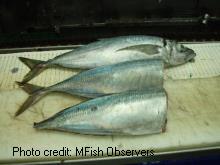|
|
Conversion Factors
In terms of tonnage most fish that is taken in New Zealand fisheries waters is either partly or fully processed at sea. Partly processed could mean, for example, that a fish is headed and gutted at sea. Fully processed could mean that a fish is filleted on a factory trawler.
In other words the weight of fish that is landed is not greenweight, which is weight of fish before any processing commences and before any part is removed. When commercial fishers complete their returns they are required to record the weight of the fish they have taken as greenweight. So how do fishers convert the weight of processed fish to greenweight?
The answer is to use conversion factors, which translate the weight of fish in the state to which it has been processed to greenweight. The more a fish is processed (ie the more of the fish that is removed) the higher the conversion factor and vice versa.
 A conversion factor for a particular species and processed state is set after data is collected by MFish Observers either at sea or in fish processing premises. Data is checked by scientists at the National Institute of Water and Atmospheric Research (NIWA) to make sure that enough samples of processed fish have been collected to take into account variations in, for example, the time of year and the location where the samples are collected. Once the data is considered representative for the vessels that take and process that particular species it is analysed and NIWA makes a recommendation what the conversion factor should be. A conversion factor for a particular species and processed state is set after data is collected by MFish Observers either at sea or in fish processing premises. Data is checked by scientists at the National Institute of Water and Atmospheric Research (NIWA) to make sure that enough samples of processed fish have been collected to take into account variations in, for example, the time of year and the location where the samples are collected. Once the data is considered representative for the vessels that take and process that particular species it is analysed and NIWA makes a recommendation what the conversion factor should be.
MFish reviews NIWA’s recommendations and a working group, consisting of MFish and fishing industry members decides whether to accept the recommendations or not.
Once a conversion factor has been set it can be reviewed and amended from time to time. Amendments may be necessary in response to changes in, for example, fishing industry practices or cutting machine technology.
Conversion factors are applicable across all vessels. However, if a particular vessel operator believes that they can process a fish to give a higher yield (ie a lower conversion factor) than the generic conversion factor they are able to apply for a vessel-specific conversion factor. MFish will only authorise vessel-specific conversion factors if satisfied that use of a lower conversion factor is justified. Conditions are also attached to vessel-specific conversion factors, which are subject to ongoing review.
Official conversion factors are set by Gazette notice. For more information on conversion factors, refer to the document links below:
Fisheries (Conversion Factors) Amendment Notice 2013
|